- Home
- Rudy Rucker
Complete Stories Page 8
Complete Stories Read online
Page 8
We all got a little drunk that night. Somewhere towards midnight I found myself walking along the edge of the woods with Mies. He was humming softly, beating time with gentle nods of his head.
We stopped while I lit my thirtieth cigarette of the day. In the match’s fire I thought I caught something odd in Mies’s expression. “What is it?” I asked, exhaling smoke.
“The music …” he began. “The music most people listen to is not good.”
I didn’t see what he was getting at, and started my usual defense of rock music.
“Muzak,” Mies interrupted. “Isn’t that what you call it…what they play in airports?”
“Yeah. Easy listening.”
“Do you really expect that the official taste in mathematics will be any better? If everyone were to sit under the Moddler…what kind of mathematics would they ask for?”
I shrank from his suggestion. “Don’t worry, Mies. There are objective standards of mathematical truth. No one will undermine them. We’re headed for a new golden age.”
LaHaye and I took the Moddler to Foxmire the next week. It was a big estate, with a hog wallow and three holes of golf between the gatehouse and the mansion. We found Lord Vickers at work on the terrace behind his house. He was thick-set and sported pop-eyes set into a high forehead.
“Fletcher and LaHaye,” he exclaimed. “I am honored. You arrive opportunely. Behold.” He pulled a sheet of paper out of his special typewriter and handed it to me.
LaHaye was looking over my shoulder. There wasn’t much to see. Vickers used his own special mathematical notation. “It would make a nice wallpaper,” LaHaye chuckled, then added quickly, “Perhaps if you once explained the symbolism …”
Lord Vickers took the paper back with a hollow laugh. “You know very well that my symbols are all defined in my Thematics and Metathematics…a book whose acceptance you have tirelessly conspired against.”
“Let’s not open old wounds,” I broke in. “Dr. LaHaye’s remark was not seriously intended. But it illustrates a problem which every mathematician faces. The problem of communicating his work to non-specialists, to mathematical illiterates.” I went on to describe the Moddler while LaHaye left to supervise its installation in Lord Vicker’s study.
“But that is fantastic!” Vickers exclaimed, pacing back and forth excitedly. A large Yorkshire hog had ambled up to the edge of the terrace. I threw it an apple.
Suddenly Vickers was saying, “We must make a tape of Thematics and Metathematics, Dr. Fletcher.” This request caught me off-guard.
Vickers had printed his book privately, and had sent a copy to every mathematician in the world. I didn’t know of anyone who had read it. The problem was that Vickers claimed he could do things like trisect angles with ruler and compass, give an internal consistency proof for mathematics, and so on. But we mathematicians have rigorous proofs that such things are impossible. So we knew in advance that Vickers’s work contained errors, as surely as if he had claimed to have proved that he was twenty meters tall. To master his eccentric notation just to find out his specific mistakes seemed no more worthwhile than looking for the leak in a sunken ship.
But Lord Vickers had money and he had influence. I was glad LaHaye wasn’t there to hear me answer, “Of course. I’d be glad to put it on tape.”
And, God help me, I did. We had four days before Lady Vickers would bring the Appropriations Committee out for our demonstration. I spent all my waking time in Vickers’s study, smoking his cigarettes and punching in Thematics and Metathematics.
It would be nice if I could say I discovered great truths in the book, but that’s not the way it was. Vickers’s work was garbage, full of logical errors and needless obfuscation. I refrained from trying to fix up his mistakes, and just programmed in the patterns as they came. LaHaye flipped when he found out what I was up to. “We have prepared a feast for the mind,” he complained, “And you have fouled the table with this, this …”
“Think of it as a ripe Camembert,” I sighed. “And serve it last. They’ll just laugh it off.”
Lady Vickers was radiant when she heard I’d taped Thematics and Metathematics. I suggested that it was perhaps too important a work to waste on the Appropriations Committee, but she wouldn’t hear of passing it up.
Counting her, there were five people on the committee. LaHaye was the one who knew how to run the Moddler, so I took a walk while he ran each of the legislators through the three tapes.
It was a hot day. I spotted some of those hogs lying on the smooth hard earth under a huge beech tree, and I wandered over to look at them. The big fellow I’d given the apple was there, and he cocked a hopeful eye at me. I spread out my empty hands, then leaned over to scratch his ears. It was peaceful with the pigs, and after a while I lay down and rested my head on my friend’s stomach. Through the fresh green beech leaves I could see the taut blue sky.
Lady Vickers called me in. The committee was sitting around the study working on a couple of bottles of Amontillado. Lord Vickers was at the sideboard, his back turned to me. LaHaye looked flushed and desperate.
“Well,” I said.
“They didn’t like the first tape …” LaHaye began.
“Dreary, dreary,” Lady Vickers cried.
“We are not schoolchildren,” another committee member put in.
I felt the floor sinking below me. “And the second tape?”
“I don’t see how you can call that mathematics,” Lady Vickers declaimed.
“There were no equations,” someone complained.
“And it made me dizzy,” another added.
“Here’s to the new golden age of mathematics,” Lord Vickers cried suddenly.
“To Thematics and Metathematics,” his wife added, lifting her glass. There was a chorus of approving remarks.
“That was the real thing.”
“Plenty of logic.”
“And so many symbols!”
Lord Vickers was smiling at me from across the room. “There’ll be a place for you at my new institute, Fletcher.”
I took a glass of sherry.
============
Note on “A New Golden Age”
Written in Fall, 1979.
The Randolph-Macon Woman’s College Alumnae Bulletin, Summer, 1981.
My character Joseph Fletcher makes his first appearance in this story, which was inspired by a visit to the Mathematics Conference Center in Oberwolfach, Germany. At that time my grant was about to run out and I was intensively looking for a job. The only job I ended up being offered was at Randolph-Macon Woman’s College, in Lynchburg, Virginia.
Publishing a story in the R-MWC Alumnae Bulletin struck me as an ironically fitting thing to do since Charles Howard Hinton, a nineteenth century mathematical writer whom I admire, first published one of his stories about the fourth dimension in the Cheltenham Ladies’ College Journal.
Faraway Eyes
“Look at this,” my partner the genius said. He was waving a soap bubble.
I looked back at the program taking shape on my terminal’s screen. Orderly green lines of PL/II commands. “Lay off, Harry. I’m not interested.”
Harry ignored remarks like that…probably didn’t even hear them. He leaned over me heavily. A fat drop of soap solution splatted onto the keys. I sighed, punched in a SAVE, and logged off.
“Watch,” Harry said. He had one of those super-bubble frames, a big plastic ring. There was a ten-centimeter soap film stretched across it. Harry blew a gentle stream of air at the center. The big film wobbled, bulged, and then a procession of little bubbles began pinching off and floating away.
“Radioactivity, Harry,” I said, trying not to nag. “Waste disposal. Remember the NCR contract?”
He stared at the dancing soap film, thick lips parted in wonder. A bubble landed on the film and merged back in.
Someone was shouting in the reception room. Someone from New Jersey. Rosie’s footsteps came stitching down the hall. I walked past Harry and leane
d out the door. “What’s up?”
Rosie wore her hair over her face with a transparent peep-hole dyed in. Her dress was hologrammed to look like a tree-trunk. A nice girl. Sometimes I wondered what she looked like.
“There’s a man with a wheelbarrow to see you, Mister Fletcher. A Mister Kreementz?”
I remembered Kreementz. He was in charge of pollution control at Murden Chemical in Newark. Harry and I had built him a novel stack-scrubber about five years ago. There’d been no complaints before this.
“What’s in the wheelbarrow?”
Rosie glanced sidelong at Harry and tittered. “That’s the funny part. The wheelbarrow’s empty. And he keeps saying he wants to dump it out on your …”
The door from the reception room slammed open and Kreementz came surging down the hall with a big steel wheelbarrow in front of him. If it hadn’t been for the necktie, he would have looked like an angry old construction worker. Rosie and I stepped back into my office, bumping Harry.
“Garden State Degeneracy—We Deliver,” Harry said cryptically.
And then the wrath of Kreementz was upon us. “The jig is up, boys. I filed suit on my way over. You know what a plant shutdown costs per hour? You ain’t gonna sneak off and leave me holding the bag.”
He set the wheelbarrow down heavily. His suit was sweat-stained, and he was breathing hard. I wondered how an empty wheelbarrow could be so heavy.
“Sit down, Mr. Kreementz.” I gestured at my chair. “I don’t know why you think Fletcher & Company would do anything other than stand behind our products. If Murden Chemical has a problem with our emission controller, I can assure you that …”
Harry sniffed the air and winked at Rosie. He stuck his thumb out from his fist and mimed someone drinking out of a bottle. I was surprised to see him joke that way. Kreementz caught the gesture and flared up.
“That weirdo null-ray of yours is on the fritz. Every time we start it, it shuts itself off again. And they’re blaming me!” He glared at Harry. “You’d drink, too! You think it’s funny? Try this on for size!”
With a grunt he tipped the wheelbarrow forward. Something too small to see thudded on to the concrete floor. Dust and stone chips flew up. There was a terrible rumbling, like a lead beer-barrel. It was rolling towards Harry.
With a heavy man’s nimbleness, Harry stepped to the side and knelt down. There was a slowly lengthening groove in the floor. There was something at the end of the groove, something tiny that rolled and rumbled.
Rosie was standing by the door looking like a hairy fence-post. When her peephole didn’t show, you couldn’t tell which way she was facing. I assumed she was watching Harry. He seemed to fascinate her.
“Very nice,” Harry said as he inched along the floor on his hands and knees. “Come take a look, Fletch.”
I glanced inquiringly at Kreementz. “Be my guest,” he said. “We’ve got plenty more where that came from. The base of Stack Seven. That’s the one that you …”
Suddenly I got the picture.
The rumbling was still going on. It sounded for all the world like Kreementz had started a heavy little ball rolling across our floor. I got down next to Harry and squinted.
It was tiny, a fraction of a millimeter across. A little sphere, shiny like a droplet of mercury. Judging from the groove it was chewing into the floor, I guessed it weighed well over a hundred kilograms. Harry planted his thick thumb in the ball’s path. The ball rumbled under his thumb without slowing down. Pretty soon it would hit the wall.
Rosie was behind me, leaning over to see too. I shot a look up. With her hair hanging forward, I could see her face. She had a prim mouth and faraway eyes. When she saw me looking at her she stood up straight.
I got up, determined to show Kreementz who was boss. “Mister Kreementz, the null-ray was designed to compress the matter inside your stack. We did not say that the matter would then disappear. I believe I warned you to keep the stack clean.”
“But I didn’t see anything building up!” Kreementz burst out. “The first month I cleaned it out every day, but one day I missed and the gunk was gone anyway. I figured that ray of yours would make anything disappear if it stayed in long enough.”
“In other words, you haven’t cleaned the stack for almost five years of continuous operation?”
Kreementz started to nod, then glared. He’d admitted too much already.
“I guess you were right,” Harry said to me as he stood up.
“About the automatic shut-off?”
“You mean you designed the null-ray to stop working?” Kreementz demanded.
There was a sudden crunching. The little ball was drilling through our wall and into the next room. When the noise died down again I answered.
“We wanted it to be…foolproof.”
“You see,” Harry added, “If you leave something under the null-ray long enough…say five years…then it goes black hole.”
Kreementz mopped his brow. “What would have happened if we’d gotten a black hole in Stack Seven?”
“I’ll give you the good news first,” Harry said, his ropey lips twisting into a smile. “Quantum effects would force the hole to evaporate into pure energy. By measuring the energy released in the evaporation event, scientists would be able to tell whether or not the quark theory of matter is correct. Fletch, give him the bad news.”
“According to Stephen Hawking’s calculations, the ‘evaporation’ of a hundred kilogram black hole would be the same as a ten megaton nuclear blast. Of course, if the quark theory of matter is wrong, then the blast would be some ten thousand times stronger.”
“You guys would have been great on Laugh-In,” Kreementz said sourly.
“What’s Laugh-In?” Rosie asked.
“It was a TV show when Mister Kreementz was little,” I said. “He seems like a person who watched television a lot as a child, doesn’t he?”
“At least I had a childhood,” Kreementz retorted. “You guys look like you was hatched. Especially him!”
Harry was staring at the wall, shoulders hunched and fists thrust into the enormous pockets of his baggy grey polyester pants. There was a muffled crash as the little ball left the next room.
Harry turned slowly. “How many tons?”
“He means how many tons are in the stack,” I explained.
“I ain’t weighed it,” Kreementz said sullenly. “Five years worth of smoke. Maybe two hundred thousand tons.”
“But smoke is light,” Rosie protested.
“Not at Murden Chemical,” I said.
“Not when these guys are through with it,” Kreementz added. “They built us a ray which kills all the atoms inside Stack Seven. They stop vibrating and shrivel up. We have a cap on the stack. Every few minutes it gets as full of smoke as it can hold, and then the null-ray triggers, and everything inside the smokestack disappears.”
“You keep forgetting that the stuff doesn’t disappear,” I corrected. “It just collapses down to a very small size.”
“Like a trash compactor,” Rosie suggested.
I nodded. “That’s what we had in mind. One smokestack full of crud was supposed to make a hundred-kilogram block the size of a brick. But Mister Kreementz left the stuff in there to get collapsed a little more with each pulse of the null-ray. We warned him not to do that, but he did it anyway. If I hadn’t put in a mass detector coupled to a shut-off circuit, then Mister Kreementz would have turned Central Jersey into just another beautiful memory.”
The rumbling had stopped after the last crash. The shiny little speck of degenerate matter had probably sunk into our flower bed. “How dense is that stuff?” I asked Harry.
He had been scribbling on the blackboard ever since Kreementz had given him the two hundred thousand tons figure. “I get ten-to-the-eleventh grams per cubic centimeter. That’s neutronium. Plain neutrons with just enough degenerate electrons and protons mixed in to keep it stable. I’m surprised it worked.”
“Is neutronium valuable?” Kree
mentz wanted to know.
Harry opened his mouth to answer. I stepped in front of him. I had a policy of never letting Harry answer any question relating to money.
“Are you kidding?” I asked Kreementz with a mocking laugh. “Is sewage valuable? Do people like cancer? Are oil-spills good for fish? Is the Pope Jewish? You’ve got a big, dirty cleanup ahead of you, Kreementz. One false move and you’ll blow the plant sky high. I don’t envy you.” One hand was behind my back, making shooing gestures at Harry.
Kreementz sighed heavily. “You wouldn’t have a drink handy, would you?”
Rosie got him a Coke and a few ounces of lab alcohol. He took a long, thirsty pull. Deftly I set the hook. “We could organize the cleanup, but it’d be …”
“No, Fletch,” Harry said. “It’s too dangerous. I don’t think we should risk it.” He was right on the beam.
“I’ve been authorized to make you an offer,” Kreementz said, naming a reasonable sum. “It’s a lot to pay, and I still think we could win the lawsuit…but the management wants to get her started up again.”
“Triple that and we’ll have it clean in two days.”
“Double.”
“Done.”
* * * *
Actually, the cleanup was a piece of cake. We opened up the side of the smokestack and brought in bulldozers. The stuff on top was something like high-grade iron ore. The lower layers had been under the null-ray longer. We had to truck most of it out a few cubic centimeters at a time. Our trucks could only carry a hundred tons. But we’d rented a fleet of them.
Harry had poured a titaniplast floor into our basement. The stuff was a metallic compound based on the new quark chemistry. No one knew yet how strong it was…since no one had ever been able to break a piece of it after it hardened. We dumped the neutronium in the basement window. Harry was happy to have the stuff, said it had arrived just when he needed it. He took some waldoes down there and got to work. I was happy to get him and his soap bubbles out of my office.

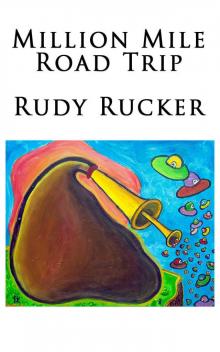 Million Mile Road Trip
Million Mile Road Trip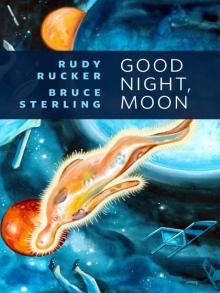 Good Night, Moon
Good Night, Moon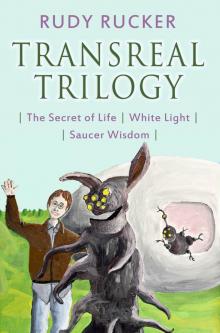 Transreal Trilogy: Secret of Life, White Light, Saucer Wisdom
Transreal Trilogy: Secret of Life, White Light, Saucer Wisdom Complete Stories
Complete Stories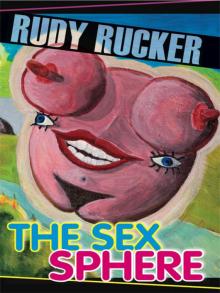 The Sex Sphere
The Sex Sphere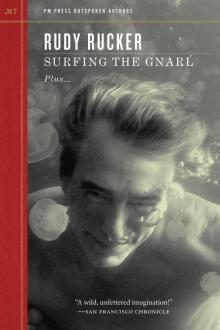 Surfing the Gnarl
Surfing the Gnarl Software
Software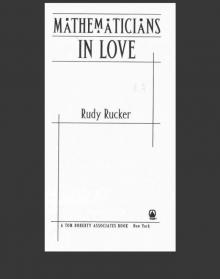 Mathematicians in Love
Mathematicians in Love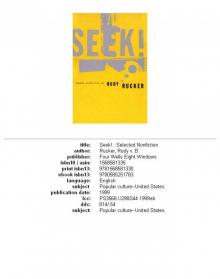 Seek!: Selected Nonfiction
Seek!: Selected Nonfiction The Secret of Life
The Secret of Life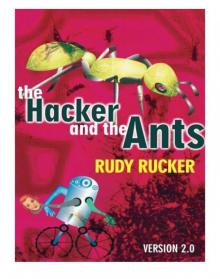 The Hacker and the Ants
The Hacker and the Ants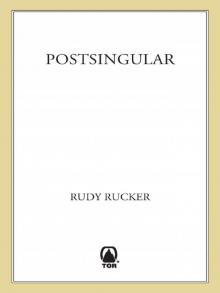 Postsingular
Postsingular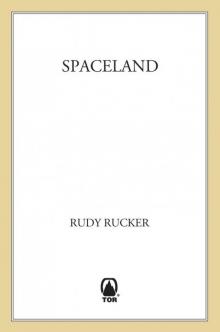 Spaceland
Spaceland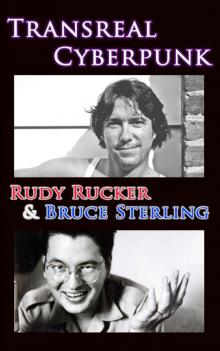 Transreal Cyberpunk
Transreal Cyberpunk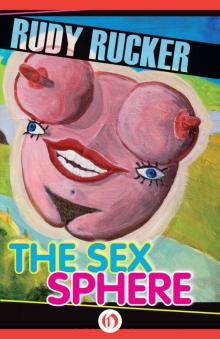 Sex Sphere
Sex Sphere Spacetime Donuts
Spacetime Donuts Freeware
Freeware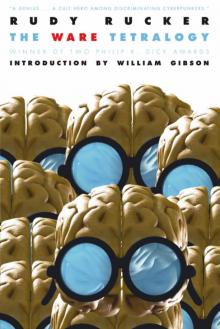 The Ware Tetralogy
The Ware Tetralogy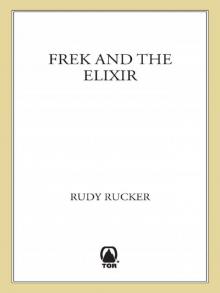 Frek and the Elixir
Frek and the Elixir Junk DNA
Junk DNA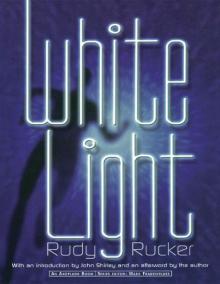 White Light (Axoplasm Books)
White Light (Axoplasm Books)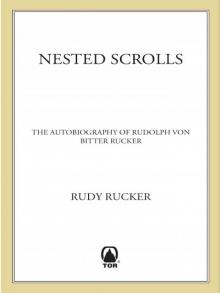 Nested Scrolls
Nested Scrolls Inside Out
Inside Out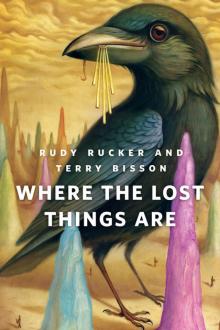 Where the Lost Things Are
Where the Lost Things Are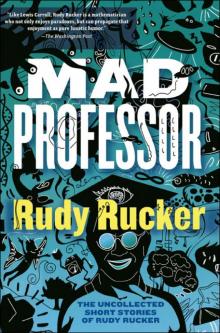 Mad Professor
Mad Professor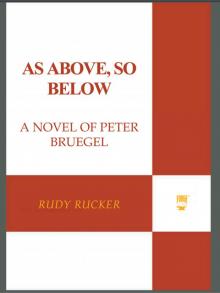 As Above, So Below
As Above, So Below Realware
Realware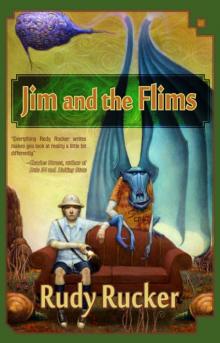 Jim and the Flims
Jim and the Flims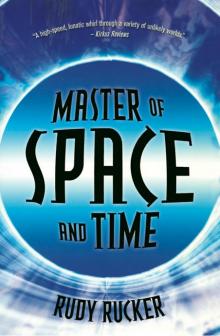 Master of Space and Time
Master of Space and Time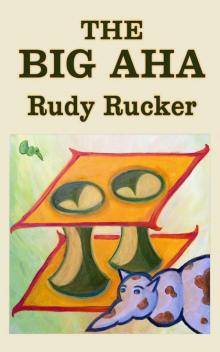 The Big Aha
The Big Aha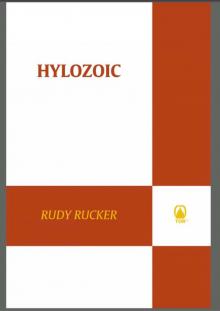 Hylozoic
Hylozoic